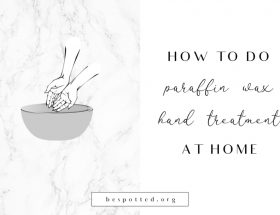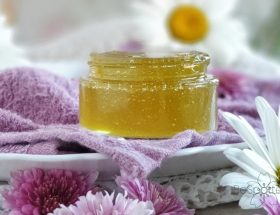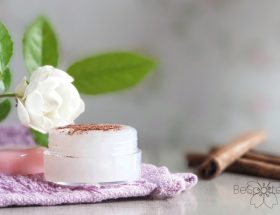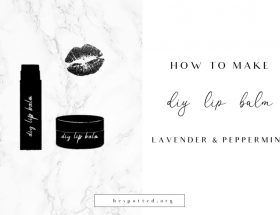This post may contain affiliate links. Any sales made through such links will reward me a small commission – at no extra cost for you!
We all experience puffiness in our face from time to time. Many people assume facial puffiness comes from a lack of sleep, but that’s not the only cause. There are many factors that contribute to swollen skin, but there are also many solutions.
If you want to reduce puffiness in your face at home, try these natural methods.
Facial Puffiness Causes
So, you wake up with a puffy face and wonder what went wrong and when. Getting to the root of how this happened will help when deciding the best treatment. It could be one or several of these factors contributing to the issue.
Makeup
Taking off your makeup before bed is essential if you want to wake up with a clean and refreshed look. Falling asleep with makeup on could lead to reactions like dermatitis, which causes redness, irritation with puffiness. Most of the time, it is no cause for major concern, but it is uncomfortable. Severe symptoms like swollen eyes may need to have medical attention.
Sleep
Lying down causes fluid to rest in the face, which is why your face may look puffy when you wake up. Certain sleep positions can cause this even more, such as face down. Waking up with a puffy face is normal, but it can more noticeable when you get too much or too little sleep.
Food
When you consume certain foods at night, it can lead to a puffier face in the morning. Typically foods with a higher sodium content will cause the body to retain more water and increase thirst. When you drink more water, the body doesn’t release it all in urine, but it will collect in other areas, like the face.
To reduce inflammation in the morning, you should refrain from having certain foods before bed. Avoid burgers, pizza, fries, bacon, pepperoni, sushi, chips, pretzels and anything else with high sodium.
Alcohol
Alcohol can cause dehydration since you are urinating more than usual. The body might start to retain water anywhere it can, leading to you waking up with a puffy face.
Menstruation
You might notice your face looking more swollen during your period, as it affects how your body retains fluid. Feeling bloated and puffy is a normal part of premenstrual syndrome.
Allergies and Infections
You may not notice it while you are asleep, but you could be breathing in dust, pollen and pet dander. It is not uncommon to have allergic reactions to these types of things. When you wake up, conditions of an allergic reaction like sneezing, congestion, itchy and watery eyes or runny nose can cause puffiness in the morning.
A sinus infection can also contribute to puffiness. Symptoms like facial tenderness, headaches, postnasal drip and stuffy nose can cause inflammation.
Health Conditions
Certain health conditions, such as hypothyroidism and Cushing syndrome, can affect facial puffiness. Hypothyroidism is when the thyroid gland isn’t producing enough hormones and can cause other conditions, along with facial puffiness.
Cushing syndrome can also cause a puffy face upon waking up. It is because the cortisol levels in your body are too high and can be a side effect of medication. It can cause facial puffiness at any time but is typically more noticeable in the morning.
Natural Home Remedies for a Puffy Face
Depending on the cause of puffiness, there are various quick and easy at-home treatments to reduce and prevent it from occurring.
1. Cold Towel
One of the simplest ways to fix puffiness in your face, especially under your eyes, is to use a cold towel or splash cool water onto your face.
Grab a clean cloth and run cold water over it. Make sure you ring it out before placing it over your eyes for a couple of minutes. Make sure you do this while you are sitting up and repeat it as many times as needed. You can also put the cloth in the fridge or freezer to get it extra cold.
2. Drink Water
When you are dehydrated, your cells and tissue absorb fluid to hold onto it in case you will not have a water source for a while. When you drink water to reduce puffiness and swelling, the cells release the stored water since they know more is coming in.
3. Eat Inflammation Fighting Foods
Certain foods are helpful in combating inflammation, especially in people with long-term inflammation conditions. The best foods include fruits, vegetables and healthy fats with omega-3 fatty acids, commonly found in fish. These nutrients can help with fighting inflammation in many areas like your joints, digestive system and skin.
4. Prop Your Head
Elevation helps keep fluid from sitting in areas of the face, like under your eyes. Stack pillows so the head lays high enough over your heart without your neck straining. Keeping an extra pillow tucked under your head is a simple way to reduce inflammation in your face.
5. Exercise
Moving your body is a great way to get the blood pumping and improve circulation. It can help reduce fluid build-up in the face or lower parts of your body. Gentle exercise is one of the most effective ways to eliminate swelling. Swimming or biking are great options to feel less bloated and more awake.
6. Apply Coffee or Tea
Coffee grounds and soaked, cool tea bags can help stimulate the skin and constrict blood vessels to reduce puffiness. Be sure the temperature isn’t too hot to avoid irritating your skin.
7. Facial Massage
Massages are great for more than just relaxation. A massage can help the fluid that settles in your tissues flow where it needs to go. Facial massages help relax your facial muscles and release tension to promote a glow since the circulation is better. A face massage can be done anywhere at any time, but it is best before bed to have less puffiness in the morning.
You can also try to enhance your massage by using facial rollers or gua sha tools.
8. Limit Salt and Alcohol
Salt is a big part of the balance of fluid in your body. Too much salt can raise blood pressure and cause the body to hold onto extra fluids. Sodium causes water to enter the bloodstream and enlarge the blood vessels. This can cause all areas of the body to swell.
Alcohol has an inflammatory effect on the body, as well. A night of drinking will cause bloating and dehydration, since lots of water is lost while using the bathroom. It is best to drink water during and after drinking to replenish fluid loss.
9. Magnesium Supplements
The mineral magnesium is an electrolyte that helps balance sodium levels and can lower puffiness in people who retain a lot of water. Be sure to talk to your doctor before starting this supplement to ensure it is safe, as it can cause issues if you have kidney or heart conditions.
The Bottom Line
Facial puffiness is not always possible to prevent, but using these strategies can help reduce the effects. With simple healthy choices, you can calm your skin and reduce puffiness naturally, no matter the cause.
Written by Cora Gold
Cora is the Editor-in-Chief of women’s lifestyle magazine, Revivalist, where she writes about style, beauty and wellness.














